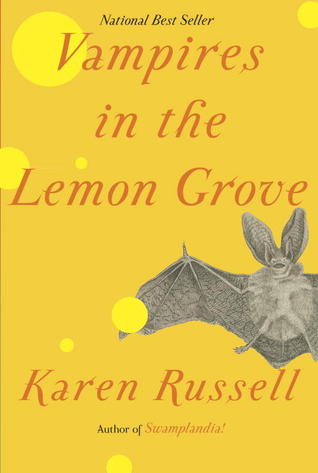
Across the course of this challenge, I’ve tended to pick authors whom I know are well-respected, or books that have sat on my ‘to read’ list endlessly, gathering dust and weeping like abandoned children. So when I saw Karen Russell’s Vampires in the Lemon Grove winking at me, a book I’ve never heard of by an author I’ve never heard of, but with a frankly excellent title, I thought Are you Abba? Because I’m gonna take a chance on you.
I’m delighted that I did. VITLG is a book of short stories, each of which follows a similar form: there’s a weird idea that forms the crux of the plot, and then Russell sets about making it feel fleshed out with believable characters. It would be wrong to call this surrealism, because there’s generally only a single oddity in each story. But it’s also not quite magic realism. It’s somewhere in-between. Or if it is magic realism, it’s 90% realism and 10% magic. It’s on the Murakami road.
Let’s be exemplokleptomaniacs and take an example: in one story, a number of former presidents of the USA awake to find themselves reincarnated as horses in a barn. A wacky premise? Yes indeed. But the actual writing feels like straight literary fiction. She uses the story to explore the types of personality that would be drawn to the presidential role, and the way they’d cope in an unfamiliar situation. She uses the fence around the barn as a metaphor for the limits of their comfort zone, and the security that they garner from being top dog (or top horse, or top horsedog) of their zone, and their inability to risk that. Once you’re past the premise, it’s all thoughtful character development. The situation feels normalised.
Another pilfered instance: a story whereby pigeons are – it’s implied – semi-malaevolently stealing small items from people in a town to significantly change the courses of their lives. Whatever your feelings on pigeons (and we all have them, be honest), the concept that they are the architects of fate is somewhat beyond credulity. But the characters in the story, how they react to the way their lives are manipulated and the idea that the loss of something small can have big life impacts are all explored realistically.
The writing has the same sense of weight as other literary fiction, with a pleasing balance between plot movement and description. It’s modern and sharp, like a fidget spinner made of knives, or a vinegar drone
I personally really enjoy any combination of plausibility and oddity, so for me this was a cracking read. If you’re less willing to suspend your disbelief, you might find this too big a bite to swallow.
--
This is my thirty-sixth book review of 100 to raise money for Refuge, the domestic abuse charity. If you liked this review, or just want to help out, please donate on the link below!
Comments
Post a Comment